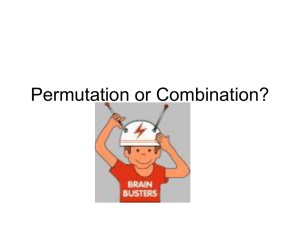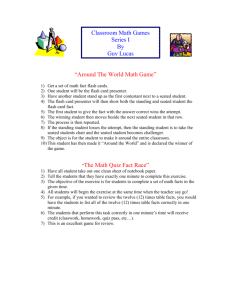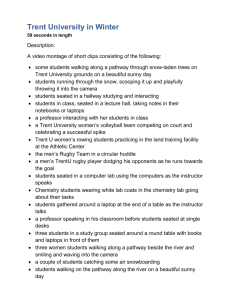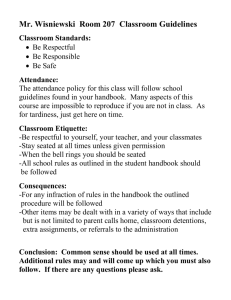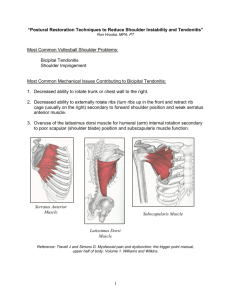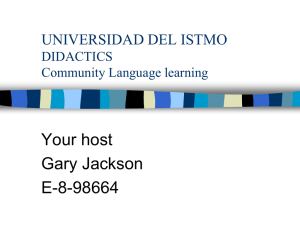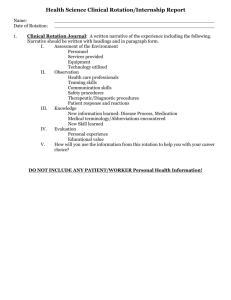Cervical Tests for Vascular Insufficiency
advertisement
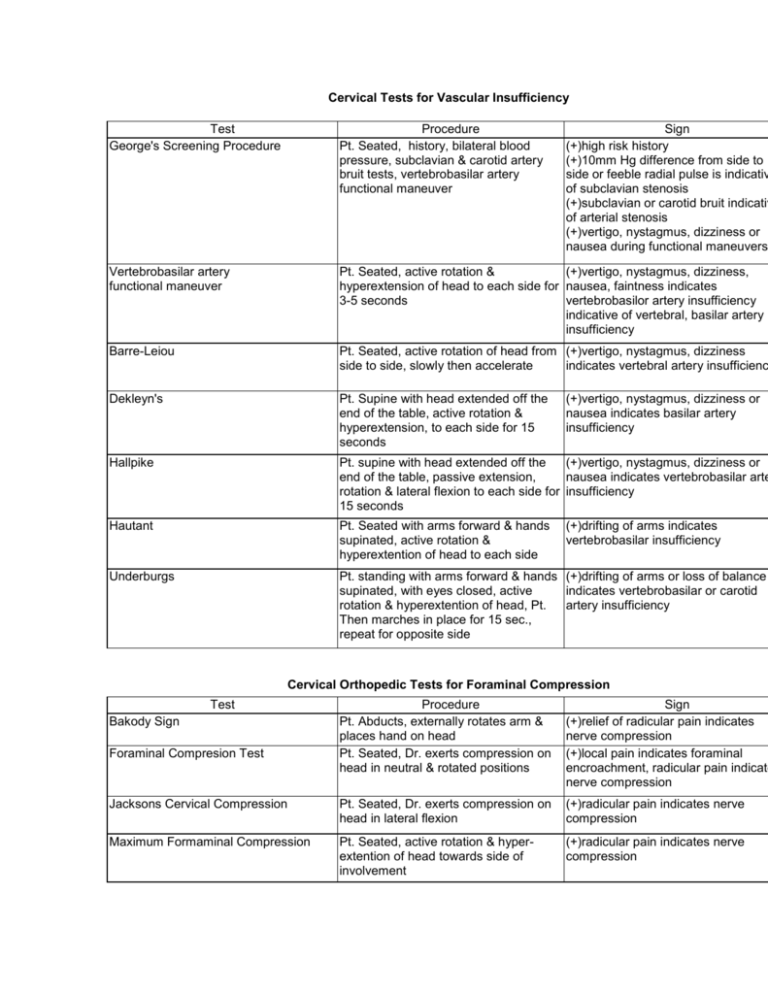
Cervical Tests for Vascular Insufficiency Test George's Screening Procedure Procedure Pt. Seated, history, bilateral blood pressure, subclavian & carotid artery bruit tests, vertebrobasilar artery functional maneuver Sign (+)high risk history (+)10mm Hg difference from side to side or feeble radial pulse is indicativ of subclavian stenosis (+)subclavian or carotid bruit indicativ of arterial stenosis (+)vertigo, nystagmus, dizziness or nausea during functional maneuvers Vertebrobasilar artery functional maneuver Pt. Seated, active rotation & (+)vertigo, nystagmus, dizziness, hyperextension of head to each side for nausea, faintness indicates 3-5 seconds vertebrobasilor artery insufficiency indicative of vertebral, basilar artery insufficiency Barre-Leiou Pt. Seated, active rotation of head from (+)vertigo, nystagmus, dizziness side to side, slowly then accelerate indicates vertebral artery insufficienc Dekleyn's Pt. Supine with head extended off the end of the table, active rotation & hyperextension, to each side for 15 seconds Hallpike Pt. supine with head extended off the (+)vertigo, nystagmus, dizziness or end of the table, passive extension, nausea indicates vertebrobasilar arte rotation & lateral flexion to each side for insufficiency 15 seconds Hautant Pt. Seated with arms forward & hands supinated, active rotation & hyperextention of head to each side Underburgs Pt. standing with arms forward & hands (+)drifting of arms or loss of balance supinated, with eyes closed, active indicates vertebrobasilar or carotid rotation & hyperextention of head, Pt. artery insufficiency Then marches in place for 15 sec., repeat for opposite side (+)vertigo, nystagmus, dizziness or nausea indicates basilar artery insufficiency (+)drifting of arms indicates vertebrobasilar insufficiency Cervical Orthopedic Tests for Foraminal Compression Test Procedure Pt. Abducts, externally rotates arm & places hand on head Pt. Seated, Dr. exerts compression on head in neutral & rotated positions Sign (+)relief of radicular pain indicates nerve compression (+)local pain indicates foraminal encroachment, radicular pain indicate nerve compression Jacksons Cervical Compression Pt. Seated, Dr. exerts compression on head in lateral flexion (+)radicular pain indicates nerve compression Maximum Formaminal Compression Pt. Seated, active rotation & hyperextention of head towards side of involvement (+)radicular pain indicates nerve compression Bakody Sign Foraminal Compresion Test Spurlings Pt. Seated, head in neutral position, Dr.places hand on top of pt. Head and delivers a vertical blow to the hand resting on head.(may repeat in lateral flexion & extension) Test Supraspinatus Tendonitis Test (Press Test) Apley Scratch Test Codman's Drop Arm Impingement Sign (+)radicular pain indicates nerve compression Shoulder Orthopedic Tests (supraspinatus) Procedure Sign Pt. Seated, active abduction of (+)pain or weakening in affected shoulders to 90 degrees with slight shoulder indicates tear in tendon internal rotation, Dr. resists abduction Pt. Seated, reaches behind head from above & below Pt. Seated, passive abduction of arm to just above 90 degrees, the arm is then dropped (+)pain indicates tendonitis in rotator cuff (usually supraspinatus) (+)pain or hunching of shoulder, indicates rotator cuff tear (supraspinatus tendon) Pt. Seated, passive abduction & internal rotation with forearm flexed. (jamming of greater tuberosity against anterior/inferior acromial surface (+)pain indicates overuse of supraspinatus Shoulder Test for Bursitis Test Dawburn's . Procedure Pt. Seated, Dr. palpates painful subacromial bursa, & passively abducts arm Sign (+)If pain disappears this indicates bursitis Shoulder Test for Dislocation Test Procedure Pt. Seated & instructed to place hand on opposite shoulder and touch elbow to chest Sign (+)pain & inablility to perform indicate dislocation Anterior Apprehension Pt. Seated, passive flexion of arm and abduction & external rotation at shoulder (+)Pt. Apprehension indicates anterio dislocation Posterior Apprehension Pt. Supine, passive flexion & internal rotation of shoulder, Dr. then applies posterior force at elbow (+)apprehension indicates posterior dislocation Calloways measure girth of affected shoulder & compare to unaffected look for lowering of axillary fold (+)increased girth indicates dislocatio Dugas Bryants Sign (+)dislocation on low side General Shoulder Pathology Test Test Mazion Shoulder Maneuver Test Speeds Test Procedure Pt. Seated, Pt. Places hand on opposite shoulder, moves elbow to forehead Sign (+)intensifies & localized pain Shoulder Orthopedic Tests (biceps tendon) Procedure Sign Pt. Seated, resisted active flexion of (+)test elicits pain in bicipital groove arm. Pt. Supinates & extends forearm indicating tendonitis during test. Dr. palpates tendon of long head of biceps Yergason's Test Pt. Seated, wth elbow fixed to 90 degrees, Dr. stabilized elbow with one hand & grasps the wrist of other hand & resists external rotation & supination (+)pain in intertubercular groove indicates biceps tenosynovitis Ludington's Test Pt. Seated & places both hands behind (+)rupture of long heads if Dr. is unab head with interlocked fingers, pt. to feel tendon Contracts & relaxes biceps while Dr. feels for tendons Abbot-Saunders Pt. Seated, passive abduction, external (+)a palpable click indicates dislocati rotation and lowering of arm, Dr. of biceps tendon Palpates long head tendon Transverse Humeral Ligament Pt. Seated, passive abduction of arm with elbow flexed, shoulder is then internally rotated & externally rotated, Dr. palpates bicipital groove. (+)If Dr. feels tendon snap in & out o groove, indicates torn transverse humeral ligament
